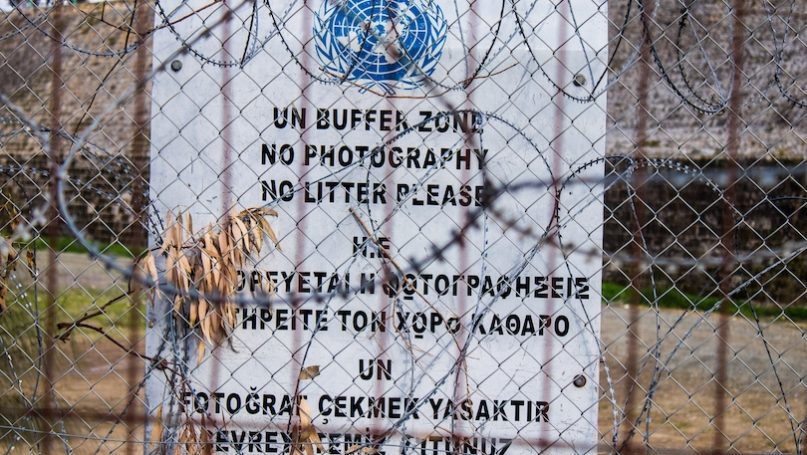
On Friday, 18 August 2023, UN peacekeepers were physically attacked for obstructing construction teams attempting to build an unauthorised road across the UN-controlled buffer zone in Cyprus. The attack took place as peacekeepers blocked construction workers from building an unauthorised road to connect the village of Arsos, located in the illegally occupied northern part of the island, with the mixed Greek Cypriot-Turkish Cypriot village of Pyla, located inside the UN buffer zone. UN personnel stationed inside the buffer zone intervened to prevent the violation, resulting in a violent confrontation that left British and Slovak peacekeepers in need of hospital treatment and caused extensive damage to UN vehicles and property.
On Saturday, 19 August 2023, European Commission President Ursula von der Leyen said:
I strongly condemn the attacks on @UN_CYPRUS peacekeepers by Turkish Cypriot personnel. Threats and assaults on UN peacekeepers are unacceptable. The EU also calls on the Turkish Cypriot side to respect the UN mission’s mandate in the buffer zone and refrain from actions that escalate tensions.
The attack was also condemned by the UN Secretary-General on the same day, who stated: “The Secretary-General stresses that threats to the safety of UN peacekeepers and damage to UN property are unacceptable and may constitute serious crimes under international law.” The incident is reminiscent of the troubled relationship between the two communities and the complexities surrounding the Cyprus conflict. More worryingly, it raises concerns about stability in the region and the maintenance of the current status quo.
To understand the seriousness of the incident, to be presented before the UN Security Council on 20 August 2023, it is important to understand the significance of the buffer zone and the role of the UNFICYP mission in preserving peace in the region. In 1964, escalating tensions between the Greek Cypriot and Turkish Cypriot communities culminated in intercommunal violence erupting in December 1963. This led to significant casualties and displacement for both communities. Following the illegal military invasion of Turkey in Cyprus in 1974, which remains to this date, the UN launched a series of negotiations and mediation efforts to resolve the conflict. The United Nations Security Council called for a ceasefire, the establishment of a United Nations Peacekeeping Force in Cyprus (UNFICYP), and the creation of a buffer zone to keep the peace between the two sides.
The UN buffer zone was created on the basis of a number of UN Security Council resolutions. Resolution 186 (1964) recommended the creation, with the consent of the Government of Cyprus, of a United Nations Peace keeping Force in Cyprus (UNFICYP), initially, for the period of three months [as per paragraph 6 of Res 186 (1964)]. Subsequent resolutions extended the mandate of UNFICYP, establishing a framework for the maintenance of the buffer zone beyond the original period, as well as strengthening the role of UNFICYP in overseeing its implementation. The buffer zone in Cyprus, also known as the Green Line (Greek: “πράσινη γραμμή”, Turkish: “Yeşil Hat”), remains to this date as the de-militarised strip of land that divides the internationally recognised Republic of Cyprus in the southern part of the island, from the self-declared “Turkish Republic of Northern Cyprus” established following the illegal occupation of Cyprus by Turkey in 1974.
The recent attack against UN peacekeeping personnel constitute within the buffer zone constitutes a serious violation of international law that threatens that fragile status quo. The United Nations Convention on the Safety of United Nations and Associated Personnel 1994 reiterates that UN personnel should be able to carry out their duties without threats of an attack or physical attacks. The Convention also requires that “State Parties establish criminal offences punishable by appropriate penalties, and to cooperate in the prevention of such crimes and in providing assistance to one another in connection with criminal proceedings”.
The Cyprus UN buffer zone, which maintains the island’s status quo to the present day, stretches roughly 180km (112 miles) across the island. The mission counts almost 1100 serving personnel from over 21 countries, with the United Kingdom, Argentina and Slovakia being the top military contributors at present. The presence of UN personnel in the buffer zone in Cyprus is sanctioned by international agreements aimed at facilitating dialogue and cooperation between the two sides. Attacking or clashing with UN personnel is not only a violation of international law but also undermines the efforts of the international community to find a peaceful resolution to the Cyprus conflict.
The UN Security Council and the international community must come together to help de-escalate the crisis and send a powerful message that violations of international law, by either side, will not be tolerated and that peaceful solutions must be pursued. It is imperative that the international community remains committed to facilitating peaceful dialogue and pursuing a fair and lasting solution to the Cyprus conflict, while upholding the principles of international law that are essential for maintaining peace and stability in the region.
Further Reading on E-International Relations
- Alternative Approaches to Self-Determination Applied to the Cyprus Conflict
- National Responses to the Syrian Refugee Crisis: The Cases of Israel and Cyprus
- Turkey and the Eastern Mediterranean: A Chance for Cooperation or a Warning of Conflict?
- Theory Synthesis in Sport and International Relations Research
- Opinion – The European Union’s Status in the Russia-Ukraine Crisis
- Opinion – The Status of China’s Confucius Institutes in American Universities